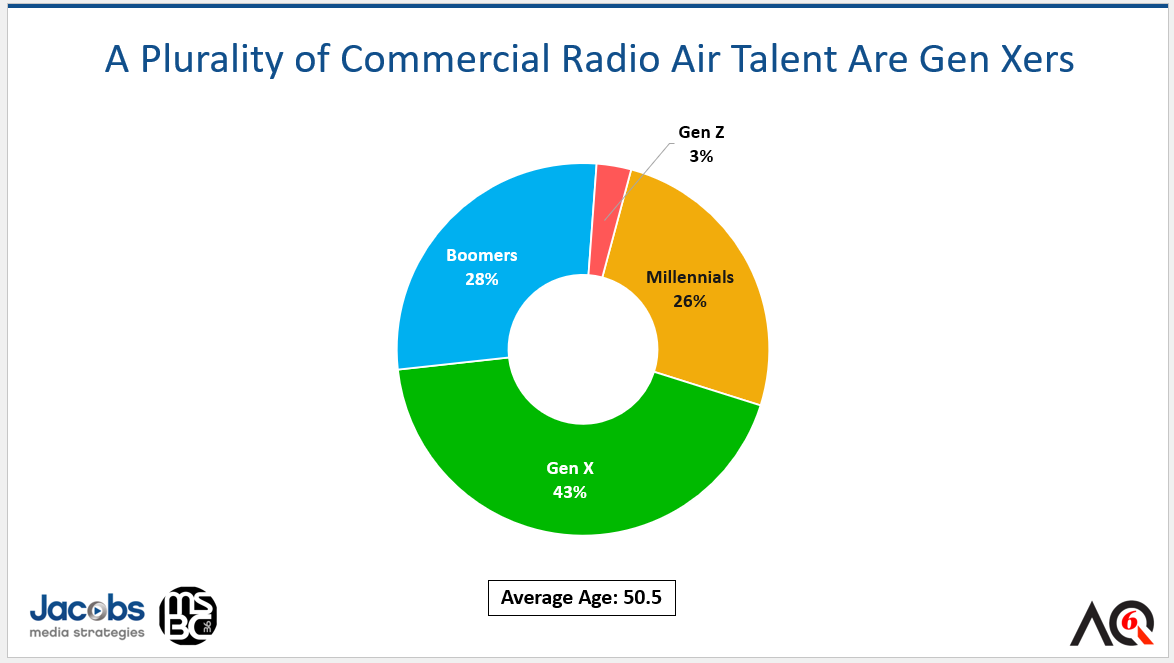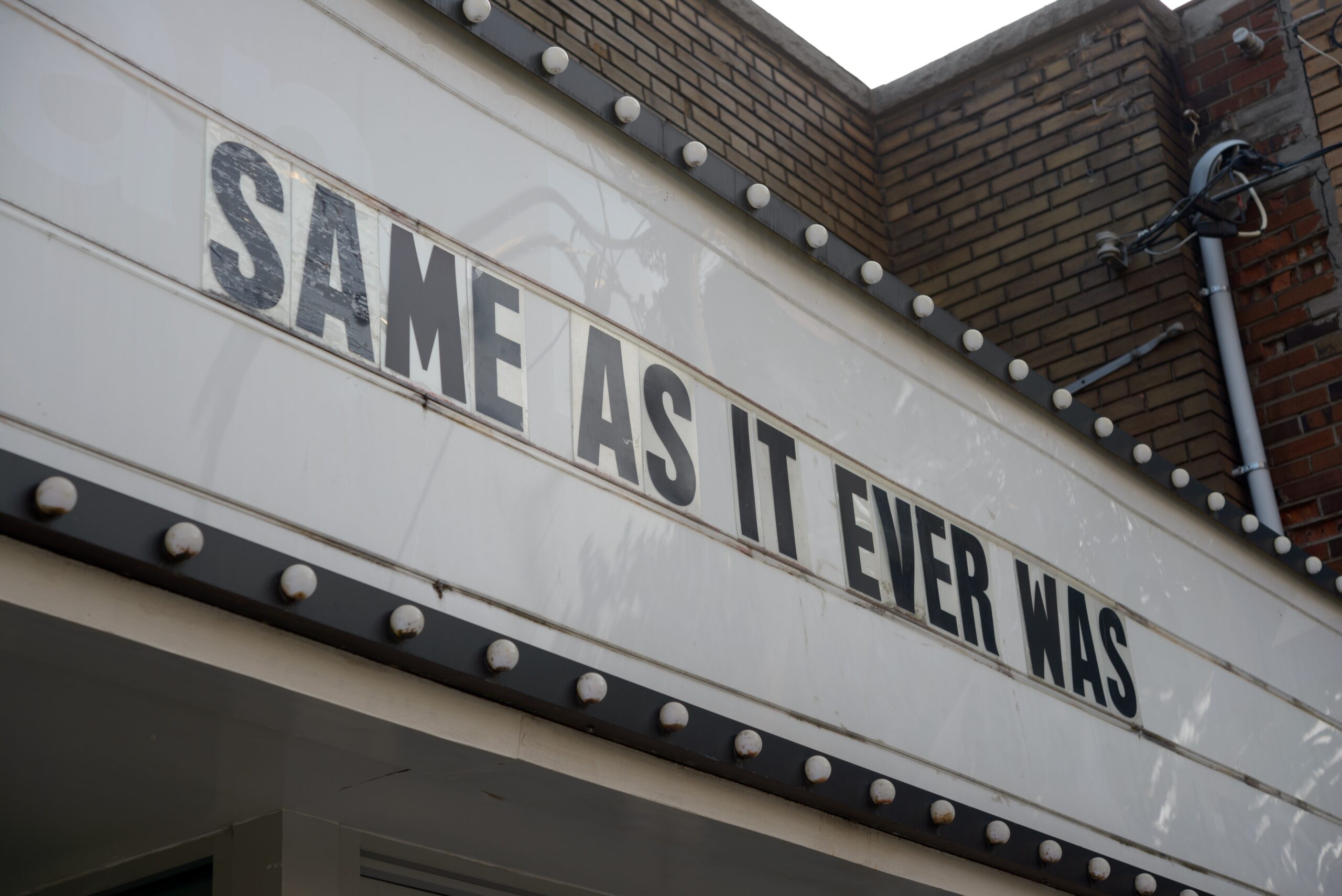
These days, I keep hearing the lyrics to the Talking Heads song “Once in a Lifetime” earworming its way into my reactions I see around me. (I did use some poetic license and shifted a pronoun, but the question is still a good one.)
“Well, how did we get here?”
The question is in response to a recent story in The New York Times By Steven Kurutz:
(I used one of my “share article” options in the link above, so that may get you through their paywall. The article is most certainly worth your time.)
Ironically, Kurutz uses another fatalistic song from the same era, “It’s the End of the World as We Know It (and I Feel Fine)” by R.E.M. to make his point. For Gen Xers, things are far from fine, especially when it comes to their careers.
His idea is that when it comes to media and image-producing careers in the ’90s—and he lists “magazine publishing, newspaper journalism, photography, graphic design, advertising, music, film, TV” (yes, everything but radio)—all these industries have been disrupted, downsized, or transformed from the way they once were.
 As a result, many of those who made a gainful living in these media categories three or more decades ago are struggling. And many are in their late 40s and 50s—in other words, Gen Xers, who have sadly gotten the short end of the societal stick since they came into the world.
As a result, many of those who made a gainful living in these media categories three or more decades ago are struggling. And many are in their late 40s and 50s—in other words, Gen Xers, who have sadly gotten the short end of the societal stick since they came into the world.
Kurutz quotes Chris Wilcha who once had a rising career as a film and television director but now finds himself at 53 years-old scraping to get meaningful work in an industry in which he excelled—until, it changed. Here’s his take:
“My peers, friends and I continue to navigate the unforeseen obsolescence of the career paths we chose in our early 20s. The skills you cultivated, the craft you honed — it’s just gone. It’s startling.”
We don’t have “census” data for the radio broadcasting industry. While there are still many of us Boomers stubbornly hanging on to our jobs, and a growing share of Millennials who bravely still see potential in the medium, chances are good that in the main, a plurality of broadcast radio’s workforce falls into the Gen X bucket.
At least, that’s the age group air talent tends to occupy. Our AQ study of commercial radio personalities shows Generation X—those born between 1965 to 1980—as the largest.

Between the digital explosion that began in the ’90s with the Internet to AI today, the Times story says these mega-changes have left Xers asking, “Now what?”
But those in their 40s and 50s working in radio weren’t the only ones gobsmacked by shifting sands of the media and technology sectors. Broadcast radio’s ownership was every bit caught off-guard by the exponential changes that upended the once comfortably stable radio industry.
Looking at the early ’00s, the growth and proliferation of hi-speed Internet, along with the debuts of smartphones, social media, YouTube, streaming music, satellite radio, and even the beginning of podcasting all flooded the media zone.
And at the very same time, radio chieftains were busy consolidating, seeking economies of scale rather than using their newly deregulated industry to create better products, bigger personality franchises, product diversification, and more lasting and engaging brands.
With a few notable exceptions, most failed to embrace the digital revolution, opting instead to stay the course, wait on the sidelines, and double-down on the status quo. The “93 percenters” insisted radio would win out at the end, that “radio was the original social media,” and there was no road to profitability in streaming, so why invest much in the way of people and money?
insisted radio would win out at the end, that “radio was the original social media,” and there was no road to profitability in streaming, so why invest much in the way of people and money?
Efforts to modernize broadcast radio’s technology and expand its content fell mostly flat for a radio industry content to go its own way. While Steve Jobs was marketing the iPhone, Jeff Smulyan was hawking NextRadio. And while Sirius and XM (separate at the beginning) were creating hundreds of diverse, commercial-free music and spoken word channels for the car, radio broadcasters were in-fighting over HD radio and its secondary channels, none of which made an impact with audiences or advertisers because broadcasters never invested in them from the git-go.
 And it makes you wonder whether the desire for even further deregulation from the newly cast Trump FCC will solve any more problems in 2025 than it did back in 1996. Owning more stations in Des Moines, Dallas, or Detroit isn’t likely to lead to a better product, flowing revenue, or advanced digital features or tools.
And it makes you wonder whether the desire for even further deregulation from the newly cast Trump FCC will solve any more problems in 2025 than it did back in 1996. Owning more stations in Des Moines, Dallas, or Detroit isn’t likely to lead to a better product, flowing revenue, or advanced digital features or tools.
It isn’t likely to produce better content or better community service. Broadcasters may find out the net-net of owning more stations in the market will simply serve to corner an ever-shrinking medium returning even less on the investment.
That’s because it’s no longer about how many stations you own but what you decide to do with them. The hubris that drove the arrogant question, “Where else are they going to go?” in 1996 as broadcasters created duopolies, triopolies, and later clusters was eventually met with a resounding “Anywhere and everywhere we want.” There is no longer a scarcity of what radio once did. Much of that content is now available on lots of different channels and outlets. Is radio’s content comparable (or superior) to what consumers can easily access on other platforms? Rather than debate, let’s allow today’s consumers to make that judgement.
broadcasters created duopolies, triopolies, and later clusters was eventually met with a resounding “Anywhere and everywhere we want.” There is no longer a scarcity of what radio once did. Much of that content is now available on lots of different channels and outlets. Is radio’s content comparable (or superior) to what consumers can easily access on other platforms? Rather than debate, let’s allow today’s consumers to make that judgement.
As a radio Boomer, I have a certain empathy for industry Gen Xers caught between two very different radio worlds. But I also worry about Millennials and Gen Zs investing valuable hunks the early phases of their careers in the radio business.
Where will all of them be in 2030?
 Will they be asking “Now what?” and who will give them a straight answer?
Will they be asking “Now what?” and who will give them a straight answer?
Or instead, will they learn the hard way and reach this conclusion?
“Same as it ever was.”
A lot of questions here and I’ll do my best to answer as many as I can when our Techsurvey 2025 webinar takes place Tuesday, April 15 at 2pm ET. We’ll cover a lot of ground in a fast-moving hour-long presentation. Lots of good seats still available 🙂 so bring the whole team. To register, click here.
Also, special thanks to Dave Beasing. – FJ
- Is It Time For Radio to WAKE UP?! - June 1, 2025
- For Radio, The Perils Of Rebranding - May 30, 2025
- There’s No Failure In Radio - May 29, 2025




Thank you Fred. Boomer Broadcasters will supply the timely fix.
Very appropriate concerns and framing, Fred. As a semi retired young boomer, I am working with students and young people frequently, and worry over the fact that we don’t have places for them to gain experience in radio or other media. We have more channels than ever, but fewer experienced Talent with time, and fewer places for people to get experience. Good experience, where pronunciations are corrected, clarity is shaped and grammar is tweaked. Those Sunday night public affairs shifts where many of us started are long gone. Clearly, automation allows us to do more, but it trains no one. Our Gen X talent may be the last wave of people who had even that experience
Scott, thanks for these observatons. You’re an experienced public radio broadcaster who’s been through the rigamarole of both internal and external threats. Today’s dilemmas are different (but similar) versions to what radio has gone through in prior challenges. Nonoetheless, it’s going to require strategic thought and innovative thinking – both of which are in short supply.
“Radio chieftains were busy consolidating, seeking economies of scale rather than using their newly deregulated industry to create better products, bigger personality franchises, product diversification, and more lasting and engaging brands.”
That pretty much sums it up. And you brought up a good point – will even MORE deregulation fix this? With the debt these companies are carrying… I’m thinking no. As a Show BUSINESS, this hasn’t worked.
What if… we went the other way? TeleComm 96 got us into this mess, maybe it’s time go the way of Bell System or the Paramount Decree and break it all up. Sell to local investors at fair market value. There’ll be some churn, and some stations will go dark – but will any jobs really be lost at this point? Some money will be lost, but was it ever going to be paid back? Were those investments ever really worth the mark-up paid for them? The economic environment of the broadcasting industry needs to change. Break it up. Local stations generating revenue that stays local rather than feeding the Debt Monster. Attract creative types to this as a SHOW Business again. Then, the next Todd Storz, Delilah, Rush Limbaugh, or Tom Joyner can come along and usher in the next iteration of radio – whatever that will be.
Or, sure, stay the course… but it hasn’t been all that compelling lately. And we keep watching the attrition happen as we surrender daypart after daypart, concentrating now on maximizing use of the car radio for background noise on the commute.
Chat, thanks for this. As we both pointed out, more deregulation is certainly a questionable approach, simply as runing a radio company has reqiuired more panache, differentiation, and compellingness – all with less revenue. I’m also hardpressed to imagine that even if deregulation passes (and it is supposed to), how beleaguered broadcasters would come up with the money to buy more stations in local markets to get the nexxt phases of the story. Thanks for commenting.
Chet, I think a lot of people will read your comment and dream about “reverse engineering” the TeleComm Act of ’96. As both a consumer of radio, and someone who worked in the business for more than a couple of decades before that bill was passed, my personal and profesional belief is that radio was better off = as both an entertainmnet industry but also a marketing vehicle – before its passage. There were many more owners so the wealth was diluted across many more players. But radio was a better medium. Wall Street, of course, demands more and more profits, higher margins, and beating last year’s numbers. And maybe that’s part of the problem holdig an industry like radio to the same financial standards as Walmaart. Thanks for the thoughtful commment.